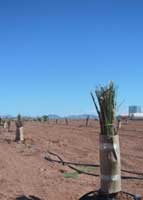Suitable soil for dates
Nurturing Success: Unveiling the Perfect Soil for Thriving Date Palm Plantations
Beneath the Roots: The Art and Science of Selecting Ideal Soil for Dates
Embark on a journey to discover the key to successful date palm cultivation by unraveling the secrets of choosing the right soil. In this comprehensive guide, we delve into the characteristics and nuances that make soil suitable for fostering optimal growth in date palm plantations. Join us in understanding the art and science beneath the roots of cultivating thriving date palms. Suitable soil for dates
Sowing the Foundation: Characteristics of Ideal Date Palm Soil
1. Exceptional Drainage Qualities
Explore the critical role of exceptional drainage in the ideal soil for date palms. Discover how well-draining soil prevents water stagnation, ensuring the roots receive sufficient oxygen and minimizing the risk of root-related issues.
2. Balanced Texture for Root Development
Dive into the importance of a balanced soil texture that promotes robust root development. Understand how the right combination of sand, silt, and clay creates an optimal environment for date palm roots to establish and thrive.
The Chemistry of Growth: Soil Composition Essentials
1. Nutrient-Rich Soil Structure
Delve into the significance of a nutrient-rich soil structure for date palm cultivation. Explore how the presence of essential nutrients in the soil contributes to the overall health and productivity of date palms.
2. pH Levels and Soil Acidity
Understand the role of pH levels in soil acidity and alkalinity. Explore the ideal pH range for date palms and how maintaining proper acidity levels fosters nutrient absorption and healthy growth.
Creating a Nutrient-Rich Haven for Date Palms
Uncover the intricacies of creating a nutrient-rich haven in the soil for date palms. From micronutrients to macronutrients, explore the balance needed to support the nutritional needs of date palm trees throughout their growth stages. Suitable soil for dates
Water Matters: Soil Moisture and Irrigation Considerations
1. Optimal Moisture Retention
Explore the importance of optimal moisture retention in date palm soil. Understand how a balance between retaining enough moisture for hydration and allowing excess water to drain helps maintain a healthy soil environment.
2. Strategic Irrigation Practices
Delve into strategic irrigation practices that complement the soil characteristics. Learn how controlled and efficient irrigation contributes to water conservation and the prevention of water-related soil issues.
Mastering the Art of Soil Moisture Management
Master the art of soil moisture management for date palm plantations. Discover techniques and best practices that ensure the soil maintains the right balance of moisture for sustained growth and vitality. Suitable soil for dates .
Tailored for Success: Soil Amendments and Enrichment
1. Organic Matter Integration
Understand the benefits of integrating organic matter into the soil for date palm cultivation. Explore how organic amendments enhance soil structure, fertility, and microbial activity, creating a thriving environment for date palms.
2. Selective Enrichment for Soil Improvement
Delve into the selective enrichment of soil to address specific deficiencies. Learn how targeted amendments enhance soil quality, ensuring that date palm plantations receive the tailored nourishment needed for optimal growth.
Precision in Soil Enrichment Techniques
Explore the precision involved in soil enrichment techniques tailored to date palm requirements. From precise nutrient ratios to strategic application methods, uncover the art of enhancing soil quality for thriving date palm plantations.
Soil Testing and Monitoring: A Proactive Approach
1. Regular Soil Testing Protocols
Discover the importance of implementing regular soil testing protocols. Understand how proactive soil testing helps monitor nutrient levels, identify potential issues, and allow for timely adjustments to maintain optimal soil conditions.
2. Technology-Assisted Soil Monitoring
Delve into the benefits of technology-assisted soil monitoring. Explore how advanced tools and techniques contribute to real-time data collection, enabling precision in soil management for sustained date palm health. Suitable soil for dates
Harnessing Technology for Soil Precision
Uncover the ways in which technology is harnessed to achieve precision in soil management for date palm plantations. From soil sensors to data analytics, explore the role of modern tools in ensuring the ongoing health of the soil.
Cultivating Excellence: The Perfect Soil for Thriving Date Palms
In conclusion, cultivating excellence in date palm plantations begins with selecting the perfect soil. By understanding the characteristics, chemistry, and moisture needs of the soil, we pave the way for thriving date palms. Join us in embracing the art and science beneath the roots for a future of flourishing date palm plantations. Suitable soil for dates
The date thrives in sand, sandy loam, clay, and other heavy soils. It needs good drainage and aeration. It is remarkably tolerant of alkali. A moderate degree of salinity is not harmful but excessive salt will stunt growth and lower the quality of the fruit.

